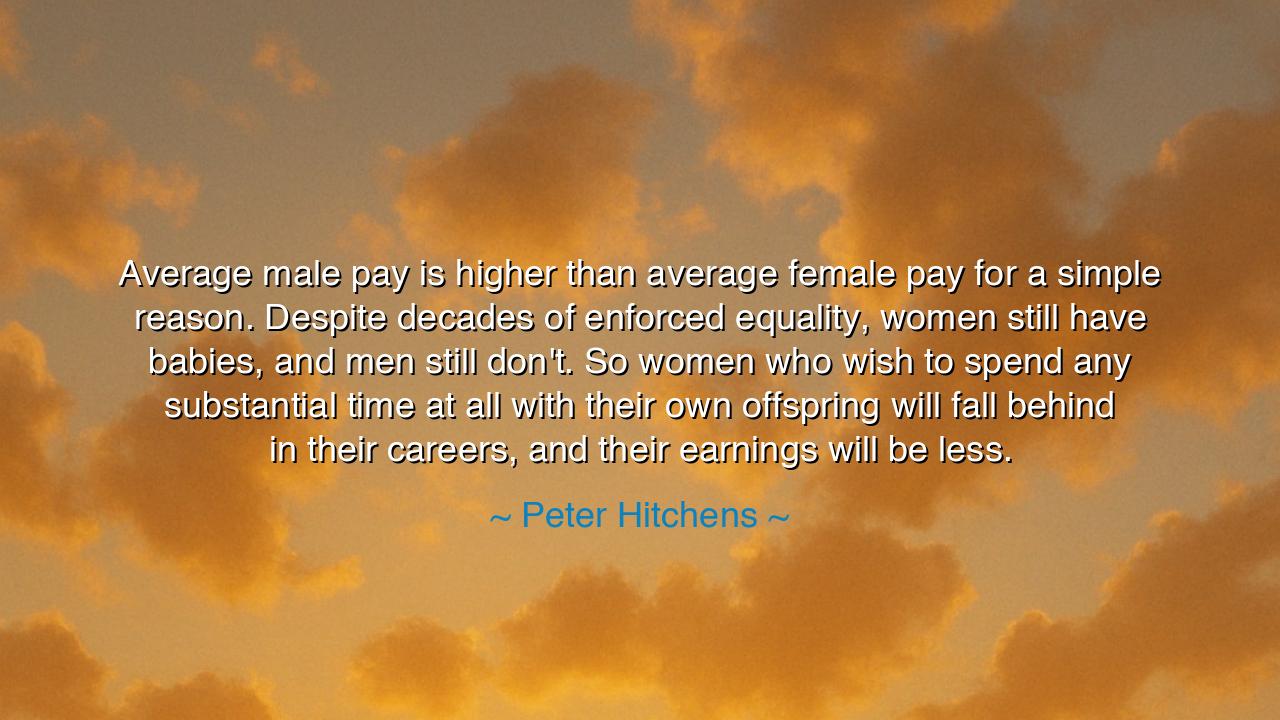
Average male pay is higher than average female pay for a simple
Average male pay is higher than average female pay for a simple reason. Despite decades of enforced equality, women still have babies, and men still don't. So women who wish to spend any substantial time at all with their own offspring will fall behind in their careers, and their earnings will be less.






The words of Peter Hitchens, though wrapped in the language of reason, touch upon one of the deepest and most enduring tensions in the human story: “Average male pay is higher than average female pay for a simple reason. Despite decades of enforced equality, women still have babies, and men still don’t. So women who wish to spend any substantial time at all with their own offspring will fall behind in their careers, and their earnings will be less.”
Beneath this plain declaration lies a profound reflection — one not of cynicism, but of the eternal balance between nature and society, between the duties of creation and the demands of ambition. It is a truth both ancient and painful: that the work of giving life, though sacred, often exacts a cost in the worldly scales of power and wealth.
Since the dawn of civilization, woman has carried the double crown — creator and nurturer, the source of life and the keeper of its flame. In the temples of Egypt, the goddess Isis was worshipped not for her beauty, but for her endurance — for holding her child, Horus, in her arms while rebuilding the broken body of her husband. In her, we see the same duality that Hitchens names: that to nurture life is to pause one’s own ascent, to step aside while others climb. Yet to do so is not weakness, but sacrifice in its highest form. For the one who gives time to love does not lose — they invest in eternity.
The modern age, in its noble pursuit of equality, has often forgotten that equality does not mean sameness. Man and woman are not identical stars, but complementary forces — one shaped by the call to provide, the other by the call to sustain. The tragedy arises not from difference itself, but from a world that fails to honor both roles equally. The mother who pauses her career to cradle her child does not fall behind in worth, but only in the currency of commerce — a measure too shallow to grasp the depth of her labor. And yet society, blinded by numbers and status, calls her “less.”
Consider the story of Marie Curie, who, though destined for greatness, worked through exhaustion, grief, and motherhood. Her discoveries in radioactivity changed the course of science, yet her path was riddled with hardship. When her husband Pierre died, she carried both his legacy and the burden of raising two daughters alone. Her career, interrupted by tragedy and maternal duty, did not burn less brightly — it burned with a deeper light, tempered by struggle. Thus, Curie’s life stands as a testament that even when time divides a woman’s path, her essence need not be divided. Her strength lies not in choosing one calling over another, but in enduring both.
Hitchens’s statement, when read with wisdom and not with bitterness, reveals an enduring paradox: that true equality must account for difference, not erase it. The world often measures success by uninterrupted progress — by the unbroken line of promotions, achievements, and wealth. But the path of a mother, interrupted though it may seem, follows a different rhythm — one of cycles, seasons, and renewal. She steps away, not out of failure, but to fulfill the oldest and noblest of duties: to sustain the future itself.
Let this truth be understood, then, by those who shape the laws and customs of our time: equality is not achieved when men and women live the same lives, but when both lives are honored with equal dignity. If a woman bears life, then society must bear her burdens. If she steps aside to raise her children, then the world must step forward to ensure she is not cast into shadow. For the measure of a civilization is not how high its towers rise, but how well it protects the ones who build its foundation — and every mother is such a builder.
Therefore, my child, do not see in these words a verdict of despair, but a call to balance. If you are a woman, walk proudly in the path you choose — whether it leads to the cradle or the crown, or to both. And if you are a man, honor the weight of that sacred choice; know that freedom was not meant to erase difference, but to ennoble it. For nature and equality are not enemies, but two wings of the same bird — and only when both are strong can humanity truly soar.






AAdministratorAdministrator
Welcome, honored guests. Please leave a comment, we will respond soon